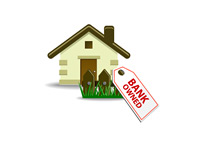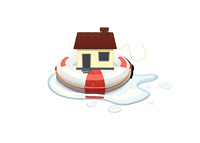A Bottom in the Housing Market? 10 Signs That Will Help You Identify a Bottom
 Trying to time the bottom in the housing market can be risky business. You may be waiting to put your money to work. You might think that a $300,000 home which used to be $500,000 is a steal of a deal, and that it couldn't possibly continue dropping in value. Think again. An asset is only worth what someone else is willing to pay for it - if no one is willing to pay $300,000 for that home, then it will keep dropping, no matter how much of a value that you think the home might be.
Trying to time the bottom in the housing market can be risky business. You may be waiting to put your money to work. You might think that a $300,000 home which used to be $500,000 is a steal of a deal, and that it couldn't possibly continue dropping in value. Think again. An asset is only worth what someone else is willing to pay for it - if no one is willing to pay $300,000 for that home, then it will keep dropping, no matter how much of a value that you think the home might be. Blindly speculating on a bottom can be financially perilous - surely you wouldn't be too happy if that home you bought for $300,000 dropped another 20%. Hey, it could happen. There is a reason why wise people will tell you that you should never try to "catch a falling knife". With inflation, a 20% haircut on the value of your newly purchased home could take many years to recover from.
So when do you know that we have hit a bottom? You'll never know for sure, but here are ten things to look for that will help you to identify a good entry point for your real estate purchase:
1. Foreclosures decreasing. Banks don't want to foreclose on their customers. An increase in foreclosures = an increase in supply, and a drop in prices. Economics 101. Less supply equals rising home values. There is way too much supply on the market right now due to a spike in foreclosures. Once this trend reverses, prices can start to increase again.
2. Bank-owned properties decreasing. This is tied to number one. Foreclosures could level off, but bank-owned properties may remain high if banks aren't able to offload their homes. Look to companies such as Countrywide. They post the number of properties on their books publicly. Once the number of homes on their books starts to decrease, the market can begin to tighten and values can begin to increase.
3. Existing home-sales increasing. An extremely important indicator. High demand equals a high amount of existing home-sales. Obviously, when demand increases, prices will start to rise. No one want to commit any money right now, and existing home sales are plummeting. This is information is publicly available.
4. New home starts dropping. Look at a situation like the Miami condo market. This particular market was savaged due to the fact that builders were overzealous and overestimated demand. A decrease in new supply with increase demand.
5. Applications for mortgages increasing. This information is available to the public as well. Increased demand is obviously a must for a recovering housing market. If more people are applying for mortgages, it means that more homes will be bought, and demand will increase.
6. Improving economy. No one particularly wants to commit to a large mortgage if they are worried about their job prospects. An improving economy will help tremendously in increasing demand in the housing market.
7. Panic in the Streets. News headlines that scream that this is the worst housing market since the Great Depression. Your best friend who has thrown in the towel on their real estate career. Acquaintances telling you that the housing market is set to drop another 50%. The herd is usually wrong, and when the general public starts to really panic, this usually indicates a great entry point.
8. Bottoming and then strengthening Consumer Confidence Index. The Consumer Confidence Index is outrageously low right now, really the average American's concerns about the economy, etc. A rock-bottom Consumer Confidence Index reading normally indicates that a bottom is right at hand. A bottom and then a moderate increase over the course of a couple of months will likely indicate a good time to get involved in the real estate market.
9. Inventory of available listings drops. Similar to #2, except this is general listings. People throw in the towel and take their listings off the market. This just limits supply and increases demand - always a good thing.
10. Pending home sales increasing. OK, this seems like a no-brainer statistic, but it's publicly available to you and is a great indicator of how strong the market is (for obvious reasons).
All of this information is available to you in one form or another, and all of it can help you to make an informed decision. You will never know exactly when a bottom is hit (you will only know for sure years after the fact), but this information will certainly help you to pinpoint a possible bottom.
Filed under: Real Estate News | General Knowledge



